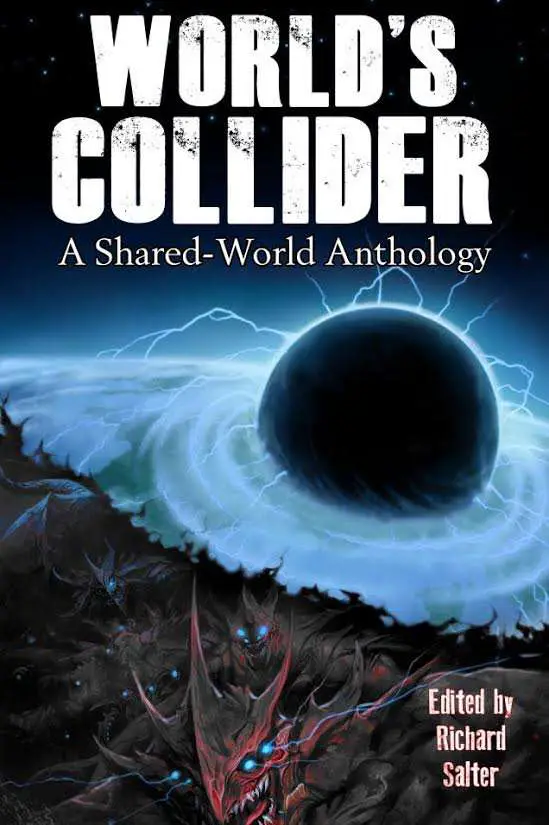World’s Collider (a shared-world anthology)
Edited by Richard Salter
Editor Richard Salter has accomplished the herculean task of orchestrating the voices of a bevy of talented writers around not only a common theme, but a common story arc with threads of events and characters weaving in and out of the different narratives. Some stories are short and to the point, some evocative of a world gone horribly awry, some grotesquely brutal and slippery with blood and gore. Some focus on external, even other worldly events, others delve deeply into the psyches and emotions of those caught up in the catastrophe and the conflicts that emerge. Some pick up on characters that were established early and continue to move the action forward throughout the book, others relate tales far away from the main action that nevertheless helped to immerse the reader in the now apocalyptic landscape.
The book opens in a gripping manner; no slow building exposition here. There’s trouble at the Large Hadron Collider in Switzerland and the concern first noted by the scientific team there have turned into abject terror. Why, we’re not quite sure, but it’s not good – something horrible and bloody has affected personnel and environment alike. Later news outlets report that the LHC has been sealed off from the inside, and rumors are running rampant – until suddenly the collider explodes, and the cataclysm begins.
Violent implosions leave a massive hole of dark nothingness in the Earth that immediately obliterates much of Switzerland and France, with casualties in the millions. Out of that dark rift comes not only a cloud of debris that moves quickly towards Western Europe and the United Kingdom, but also horrors that affect the physical, mental and emotional wellbeing of civilization as we know it.
I was thoroughly involved in this ghastly scenario from the first story on. “Wraith Lights”, by Jonathan Green, sets the stage effectively from the first page, as he plunges us directly into terror before the first rather innocuous effects are even fully realized:
She doesn’t know what’s worse; the screaming howls or the sound of pounding footsteps echoing along the passageway behind her. She doesn’t dare look round. She already knows what she’ll see, and it’s nothing good. She daren’t look down either, even though she can feel her feet slipping from under her, so she keeps going, half-running and half-sliding on the blood-slick tiles.
But it was when I hit the fourth offering, “The Rise and Fall of the House of Ricky” by Kelly Hale, that I sat back in my chair and literally let out an incredulous “whoa!” of surprise. This story didn’t take the same tack as the three that had come before; in fact, it was completely different. Set in America where the effects of catastrophe now known as “the Collision” were still far away, life goes on pretty much uninterrupted for the peevish and self-important fashion industry where a relatively new player, Ricky Soza, is taking the fashion world by storm. This wildly imaginative and pitch perfect story slammed home the idea that no matter where, no matter what, everyone would be affected by what happened in Europe – and I was hooked.
What follows is story after story, some seemingly disjointed at first glance, some pointedly moving the undulating plot line(s) forward, some painting an eerie and terrifying backdrop to the others. What happens in one story may directly influence the next, or may merely be a footnote or passing mention in another, but that inter-relation holds the entire work together in a loose but powerful web of fear and triumph. And there is never an instance where there is gratuitous gore or shock for shock’s sake – what may be gore-drenched or shocking to our sensibilities is there because it would be there in such a horrendously changing landscape.
Standouts for me were Paul Pearson’s phobic “Doors”, Trent Zelazny’s backwoods-powerful “Black Whispers”, Dave Hoskin’s freakishly imaginative “Collisions”, and Nicholas Blake’s heartrending “What Little Boys Are Made Of”, but there are no overtly weak spots in any of the contributions.
Towards the end, the main story lines of the overarching project do get stretched a bit in order to come to some sort of a conclusion (can these scenarios ever really “end”?), but this is a minor glitch in the machine. If you are an aficionado of short stories or prefer novels, if you tend to the gritty, the gory, or the understated inevitability of struggling in the face of adversity; if you like going places you’ve never been before (and hopefully never will be!), then find yourself a copy of World’s Collider. It will make reading the science section of the newspaper something you’ll never take for granted again.
—Sharon Browning
